Voleze 13.3 Mg/24 H Transdermal Patch

i

U)
Focus Pharmaceuticals Ltd
PACKAGE LEAFLET: INFORMATION FOR THE USER
Voleze 13.3 mg/24 h Transdermal Patch Rivastigmine
Read all of this leaflet carefully before you start using this medicine because it contains important information for you.
- Keep this leaflet. You may need to read it again.
- If you have any further questions, ask your doctor, pharmacist or nurse.
- This medicine has been prescribed for you only. Do not pass it on to others. It may harm them, even if their signs of illness are the same as yours.
- If you get any side effects talk to your doctor, pharmacist or nurse. This includes any possible side effects not listed in this leaflet. See section 4.
What is in this leaflet:
1. What Voleze is and what it is used for
2. What you need to know before you use Voleze
3. How to use Voleze
4. Possible side effects
5. How to store Voleze
6. Contents of the pack and other information
-G>
1 .What Voleze is and what it is used for
The active substance of Voleze is Rivastigmine.
Rivastigmine belongs to a class of substances called cholinesterase inhibitors. In patients with Alzheimer's dementia, certain nerve cells die in the brain, resulting in low levels of the neurotransmitter acetylcholine (a substance that allows nerve cells to communicate with each other). Rivastigmine 'works by blocking the enzymes that break down acetylcholine: acetylcholinesterase and
butyrylcholinesterase. By blocking these enzymes, Voleze allows levels of acetylcholine to be increased in the brain, helping to reduce the symptoms of Alzheimer's disease.
Voleze is used for the treatment of adult patients with mild to moderately severe Alzheimer's dementia, a progressive brain disorder that gradually affects memory, intellectual ability and behaviour.
-®-
2. What you need to know before you use Voleze
Do not use Voleze
■ if you are allergic to rivastigmine or any of the other ingredients of this medicine (listed in section 6)
- if you have ever had an allergic reaction to a similar type of medicine (carbamate derivatives)
- if you have a skin reaction spreading beyond the patch size, if there is a more intense local reaction (such as blisters, increasing skin inflammation, swelling) and if it does not improve within 48 hours after removal of the transdermal patch.
If this applies to you, tell your doctor and do not
apply Voleze transdermal patches.
- Warnings end-precaution*-------------
Talk to your doctor, pharmacist or nurse before
using Voleze
- if you have, or have ever had, irregular or slow heartbeat
- if you have, or have ever had, an active stomach ulcer
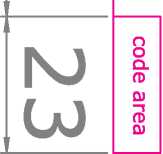

■ if you have, or have ever had, difficulties in passing urine
■ if you have, or have ever had, seizures
- if you have, or have ever had, asthma or a severe respiratory disease
- if you suffer from trembling
- if you have a low body weight
- if you have gastrointestinal reactions such as feeling sick (nausea), being sick (vomiting) and diarrhoea. You may become dehydrated (losing too much fluid) if vomiting or diarrhoea are prolonged
■ if you have impaired liver function.
If any of these apply to you, your doctor may need to monitor you more closely while you are on this medicine.
If you have not applied a patch for several days, do not apply the next one before you have talked to your doctor.
Children and adolescents
There is no relevant use of Voleze in the paediatric
population in the treatment of Alzheimer’s disease.
Other medicines and Voleze
Tell your doctor or pharmacist if you are taking,
have recently taken or might take any other
medicines, including medicines obtained without a
prescription.
i——| Voleze might interfere with anticholinergic medicines some of which are medicines used to relieve stomach cramps or spasms (e.g. dicyclomine), to treat Parkinson's disease (e.g. amantadine) or to prevent motion sickness (e.g. diphenhydramine, _kcopolamine, or meclizine).
If you have to undergo surgery whilst using Voleze transdermal patches, tell your doctor that you are using them because they may exaggerate the effects of some muscle relaxants during anaesthesia.
Voleze with food, drink and alcohol
Voleze can be used with food, drink and alcohol.
Pregnancy, breast-feeding and fertility
If you are pregnant or breast-feeding, think you may be
pregnant or are planning to have a baby, ask your
doctor or pharmacist for advice before taking this
medicine.
If you are pregnant, the benefits of using Voleze transdermal patches must be assessed against the possible effects on your unborn child. Voleze transdermal patches should not be used during pregnancy unless clearly necessary.
You should not breast-feed during treatment with Voleze transdermal patches.
Driving and using machines
Your doctor will tell you whether your illness allows you to drive vehicles and use machines safely. Voleze transdermal patches may cause fainting or severe confusion. If you feel faint or confused do not drive, use machines or perform any other tasks that require your attention.

3. How to use Voleze
Always use this medicine exactly as described in this leaflet and as your doctor has told you. Check with your doctor, pharmacist or nurse if you are not sure.
IMPORTANT:-
• take off the previous patch before putting ONE new patch on
• only one patch per day
• do not cut the patch Into pieces
• press the patch firmly in place for at least 30 seconds using the palm of the hand.
How to start treatment
Your doctor will tell you which Voleze transderma patch is most suitable for you.
• treatment usually starts with Voleze 4.6 mg/24 h*
• the recommended usual daily dose is Voleze 9.5 mg/24 h*. If well tolerated, the treating physician may consider increasing the dose to 13.3 mg/24 h
• only wear one Voleze patch at a time and replace the patch with a new one after 24 hours.
*For doses not realisable with this medicinal producl other strengths of this medicinal product are available. During the course of the treatment your doctor may adjust the dose to suit your individual needs.
If you have not applied a patch for three days, do nol apply the next one before you have talked to youi doctor. Transdermal patch treatment can be resumec at the same dose if treatment is not interrupted for more than three days. Otherwise your doctor will restart your treatment on Voleze 4.6 mg/24 h.
Where to apply your Voleze transdermal patch
• before you apply a patch, make sure that your skin is clean, dry and hairless, free of any powder, oil, moisturiser or lotion that could keep the patch from sticking to your skin properly, free of cuts, rashes and/or irritations.
• carefully remove any existing patch before putting on a new one. Having multiple patches on your body could expose you to an excessiveT" amount of this medicine which could be potentially dangerous.
• apply ONE patch per day to ONLY ONE of the possible locations shown in the following diagrams:
- left upper arm or right upper arm
- left upper chest or right upper chest (avoid breast)
- left upper back or right upper back
- left lower back or right lower back
|
Every 24 hours take off the previous patch before putting ONE new patch on to ONLY ONE of the following possible locations. | ||||||
|
Front | ||||||
|
ft |
or |
ft |
or |
ft |
or |
ft |
|
Back |
or | |||||
|
ft |
or |
ft |
or |
ft |
or |
ft |
When changing the patch, you must remove the previous day's patch before you apply the new one to a different location of skin each time (for example on the right side of your body one day, then on the left side the next day, and on your upper body one day, then on your lower body the next day). Do not apply a new patch to the same skin area twice within 14 days.
How to apply your Voleze transdermal patch
Voleze patches are thin, translucent, plastic patches that stick to the skin. Each patch is sealec in a sachet that protects it until you are ready to put it on. Do not open the sachet or remove c patch until just before you apply it.
Carefully remove the existing patch before -puttingnon -a nevrone.----------------
For patients starting treatment for the first time and for patients restarting Voleze after treatment interruption, please begin with the seconc picture.
- each patch is sealed in its own protective sachet. You should only open the sachet when you are ready to apply the patch. Cut the sachet along the dotted line with scissors one remove the patch from the sachet.
- a protective liner covers the sticky side of the patch. Peel off one side of the protective liner and do not touch the sticky part of the patch with the fingers.
- put the sticky side of the patch on the upper or lower back, upper arm or chest and then peel off the second side of the protective liner.
- then press the patch firmly in place for at least 3C seconds using the palm of the hand to make sure thal the edges stick well.
If it helps you, you may write, for example, the day ol the week, on the patch with a thin ball point pen.
The patch should be worn continuously until it is time to replace it with a new one. You may wish to experiment with different locations when applying a new patch, to find ones that are most comfortable for you and where
clothing will not rub on the patch. , ...
® (continued overleaf)

U)

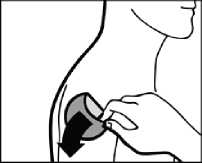
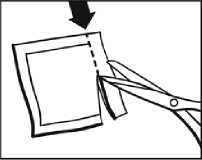

FOCUS

|
Version No.: |
103486/LF/314/02 |
|
Product Name: |
Rivastigmine transdermal 13.3mg/24h |
|
Pack Size: |
30 transdermal patches |
|
Component: |
Leaflet |
|
SKU: |
103486 |
|
Market: |
UK |
|
Production Site: |
Klocke Verpackungs -Service GmbH (Plasto Lab) |
|
Revision No.: |
2 |
|
Revision Date: |
09/12/2015 |
|
Revised by: |
ADD |
|
CRF: |
AMCo.CRF.377.2015 |
|
Dimension: |
540 x 170 mm |
|
Commodity No.: |
N/A |
|
Pharma Code: |
N/A |
|
Core Spec Ref: |
N/A |
|
DCMF: |
N/A |
|
Print Colours: |
Black |
|
Non-Print Colours: |
Cutler |
|
Tech App. Date: |
07/12/2015 |
|
Min. Font Size: |
8.5 pt |
REGULATORY AUTHORITY APPROVAL CONFIRMATION
Confirmation that this artwork has been approved by the appropriate market authority (if applicable, e.g. MHRA, HPRA, etc.) and that Amdipharm have license approval to distribute this component for sale in the relevant market.
Accept Artwork / Reject Artwork
(Please strike off whichever NOT applicable)
Signature ...................................................................
Name .......................................................................
Date .........................................................................
PAGE 1 OF 1


UJ
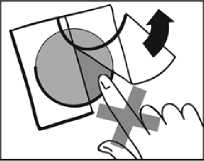
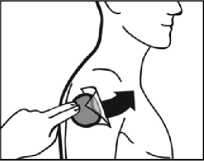
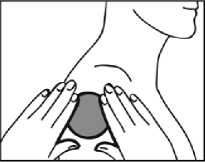
How to remove your Voleze transdermal patch
Gently pull at one edge of the patch to remove it slowly from the skin. In case the adhesive residue is left over on your skin, gently soak the area with warm water and mild soap or use baby oil to remove it. Alcohol or other dissolving liquids (nail polish remover or other solvents) should not be used.
You should wash your hands with soap and water after removing the patch. In case of contact with eyes or if the eyes become red after handling the patch, rinse immediately with plenty of water and seek medical advice if symptoms do not resolve.
Can you wear your Voleze transdermal patch when you are bathing, swimming, or in the sun?
• bathing, swimming or showering should not affect the patch. Make sure the patch does not loosen during these activities
• do not expose the patch to any external heat sources (e.g. excessive sunlight, saunas, solarium) for long periods of time.
What to do if a patch falls off
f a patch falls off, apply a new one for the rest of the day, then replace it at the same time as usual the next day.
When and for how long to apply your Voleze Iransdermal patch
• to benefit from treatment, you must apply a new patch every day, preferably at the same time of day
• only wear one Voleze patch at a time and replace the patch with a new one after 24 hours.
If you use more Voleze than you should
f you accidentally apply more than one patch,
-remove all the patches from your skin, then inform
your doctor that you have accidentally applied more than one patch. You may require medical attention. Some people who have accidentally taken too much rivastigmine have experienced feeling sick (nausea), being sick (vomiting), diarrhoea, high blood pressure and hallucinations. Slow heart beat and fainting may also occur.
If you forget to use Voleze
If you find you have forgotten to apply a patch, apply one immediately. You may apply the next patch at the usual time the next day. Do not apply two patches to make up for the one that you missed.
If you stop using Voleze
Tell your doctor or pharmacist if you stop using the patch.
If you have any further questions on the use of this medicine, ask your doctor or pharmacist.
-
4. Possible side effects
Like all medicines, this medicine can cause side effects, although not everybody gets them.
You may have side effects more often when you start your medicine or when your dose is ncreased. Usually, the side effects will slowly go away as your body gets used to the medicine. Take off your patch and tell your doctor straight away, if you notice any of the following side effects which could become serious:
Common (may affect up to 1 in 10 people)
• loss of appetite
• feeling dizzy
• feeling agitated or sleepy
• urinary incontinence (inability to retain adequate urine)
• feeling or being sick, loose motions, iiTdfgesTiomoT abdeminor path
• headache or fainting
• feeling anxious or sad
• redness, itching, swelling, irritation at the site of application of patch
• general weakness, feeling tired, loss of weight or fever.
Uncommon (may affect up to 1 in 100 people)
• problems with your heartbeat such as slow heartbeat
• seeing things that are not really there (hallucinations)
• stomach ulcer
• dehydration (losing too much fluid)
• hyperactivity (high level of activity, restlessness)
• aggression.
Rare (may affect up to 1 in 1,000 people)
• falling.
Very rare (may affect up to 1 in 10,000 people)
• stiff arms or legs
• trembling hands.
Not known (frequency cannot be estimated from the available data)
• allergic reaction where the patch was used, such as blisters or inflamed skin
• the signs of Parkinson's disease get worse -such as tremor, stiffness and shuffling
• inflammation of the pancreas - signs include serious upper stomach pain, often with feeling sick (nausea) or being sick (vomiting)
• fast or uneven heartbeat
Very rare (may affect up to I in 10,000 people)
• high blood pressure
• inflammation of the pancreas - the signs include serious upper stomach pain, often with feeling sick (nausea) or being sick (vomiting)
• bleeding in the gut - shows as blood in stools or when being sick
• seeing things that are not there (hallucinations)
• some people who have been violently sick have had tearing of the tube that connects your mouth with your stomach (oesophagus).
Reporting of side effects
If you get any side effects, talk to your doctor, pharmacist or nurse. This includes any possible side effects not listed in this leaflet.
You can also report side effects directly via the Yellow Card Scheme at: www.mhra.gov.uk/yellowcard.
By reporting side effects you can help provide more information on the safety of this medicine.
-G>
5. How to store Voleze
Keep this medicine out of the sight and reach of children.
Do not use this medicine after the expiry date which is stated on the carton and sachet after ‘EXP’. The expiry date refers to the last day of that month.
Store in the original package in order to protect from light.
Keep the transdermal patch in the sachet until use.
This medicinal product does not require any special temperature storage conditions.
Do not use any patch that is damaged or shows signs of tampering.
After removing a patch, fold it in half with the sticky sides on the inside and press them together Return the used patch to its sachet and dispose ol it in such a way that children cannot handle it. Do not touch your eyes with your fingers and wash your hands with soap and water after removing the patch. If your community burns domestic rubbish, you can dispose of the patch with your domestic rubbish. Otherwise, return used patches to a pharmacy, preferably in the origina packaging. Do not throw away any medicines vie wastewater or household waste. Ask your pharmacist how to throw away medicines you no longer use. These measures will help protect the environment.

6. Contents of the pack and other information What Voleze contains
The active substance is rivastigmine.
Each patch releasing 13.3 mg rivastigmine per 2A hours is 15 cm2 and contains 27 mg rivastigmine.
The other ingredients are:
Film: Polyester film
Fluoro-coated polyester film Drug matrix: Acrylic adhesive. Acrylates
copolymer poly (butyl methacrylat-co-methyl methacrylat) (80:20)
Adhesive matrix: Silicone adhesive
-PiinfingJnk:_____Bloc LpriotingJ ok_________
What Voleze looks like and contents of the pack Each transdermal patch is a thin patch consisting of three layers. The outer layer is translucent, white and imprinted with black-printed as follows: “Rivastigmine" "13.3 mg/24 h"
One transdermal patch is packed in one child-resistant and heat-sealed sachet. The patches are available in packs containing 7, 10, 30, 60 and 90 sachets and in multipacks containing 60 (2 x 30) and 90 (3 x 30) sachets.
Not all pack sizes may be marketed in your country.
Marketing Authorisation Holder
Focus Pharmaceuticals Limited, Capital House,
1st Floor, 85 King William Street, London EC4N 7BL, UK. Tel: 00 44(0)1283 495 280
Fax: 00 44(0)1283 495 290
Email: medinfo@focuspharma.co.uk
Manufacturer
Laboratoires Plasto Sante, 42 rue de Longvic, 21300 Chenove, France
This medicinal product is authorised in the
Member States of the EEA under the following names:
3411
Germany: Voleze 13,3mg/24h Studen transdermales Pflaster
United Kingdom: Voleze 13.3mg/24h Transderma Patch
For information in large print, audio CD or Braille please telephone 00 44 (0)1283 495 280 or email medinro@focuspharma.co.uk.
This leaflet was last revised in November 2015.

high blood pressure fits (seizures)
liver disorders (yellow skin, yellowing of the whites of eyes, abnormal darkening of the urine or unexplained nausea, vomiting, tiredness and loss of appetite)
• changes in tests which show how well the liver is working
• feeling restless
• nightmares
• seeing things that are not actually there (hallucinations).
Take off your patch and tell your doctor straight away, if you notice any of the side effects above.
Other side effects seen with rivastigmine capsules or oral solutions and which may occur with the patch:
Common (may affect up to 1 in 10 people) too much saliva loss of appetite feeling restless generally feeling unwell trembling or feeling confused increased sweating.
Uncommon (may affect up to 1 in 100 people) uneven heart rate (e.g. fast heart rate) difficulty sleeping accidental falls.
Rare (may affect up to 1 in 1,000 people) fits (seizures) ulcer in the intestine
chest pain - this may be caused by heart spasm.
103486/LF/314/02
U)

4^
U)
U1
4^
VI
4^
U)
8
Focus Pharmaceuticals Ltd
PACKAGE LEAFLET:
INFORMATION FOR THE USER
Voleze 13.3 mg/24 h Transdermal Patch Rivastigmine
Read all of this leaflet carefully before you start using this medicine because it contains important information for you.
Keep this leaflet. You may need to read it again.
If you have any further questions, ask your doctor, pharmacist or nurse.
This medicine has been prescribed for you only. Do not pass it on to others. It may harm them, even if their signs of illness are the same as yours.
If you get any side effects talk to your doctor, pharmacist or nurse. This includes any possible side effects not listed in this leaflet. See section 4.
What is in this leaflet:
1. What Voleze is and what it is used for
2. What you need to know before you use Voleze
3. How to use Voleze
4. Possible side effects
5. How to store Voleze
6. Contents of the pack and other information
<D-
1 .What Voleze is and what it is used for
The active substance of Voleze is Rivastigmine. Rivastigmine belongs to a class of substances called cholinesterase inhibitors. In patients with Alzheimer's dementia, certain nerve cells die in the brain, resulting in low levels of the neurotransmitter acetylcholine (a substance that allows nerve cells to communicate with each other). Rivastigmine works by blocking the enzymes that break down acetylcholine: acetylcholinesterase and
butyrylcholinesterase. By blocking these enzymes, Voleze allows levels of acetylcholine to be increased in the brain, helping to reduce the symptoms of Alzheimer's disease.
Voleze is used for the treatment of adult patients with mild to moderately severe Alzheimer's dementia, a progressive brain disorder that gradually affects memory, intellectual ability and behaviour.
IMPORTANT:-
• take off the previous patch before putting ONE new patch on.
• only one patch per day.
• do not cut the patch into pieces.
• press the patch firmly in place for at least 30 seconds using the palm of the hand.
How to start treatment Your doctor will tell you which Voleze transderma patch is most suitable for you.
• treatment usually starts with Voleze 4.6 mg/24 h*
• the recommended usual daily dose is Voleze 9.5 mg/24 h*. If well tolerated, the treating physician may consider increasing the dose to 13.3 mg/24 h
• only wear one Voleze patch at a time and replace the patch with a new one after 24 hours
*For doses not realisable with this medicinal producl other strengths of this medicinal product are available During the course of the treatment your doctor may adjust the dose to suit your individual needs.
If you have not applied a patch for three days, do nol apply the next one before you have talked to youi doctor. Transdermal patch treatment can be resumec at the same dose if treatment is not interrupted for more than three days. Otherwise your doctor will restart your treatment on Voleze 4.6 mg/24 h.
Where to apply your Voleze transdermal patch
• before you apply a patch, make sure that your skin is clean, dry and hairless, free of any powder, oil moisturiser or lotion that could keep the patch from sticking to your skin properly, free of cuts, rashes and/or irritations
• carefully remove any existing patch before putting on a new one. Having multiple patches on your body could expose you to an excessivef amount of this medicine which could be potentially dangerous
• apply ONE patch per day to ONLY ONE of the possible locations shown in the following diagrams:
- left upper arm or right upper arm
- left upper chest or right upper chest (avoid breast)
- left upper back or right upper back
- left lower back or right lower back
2. What you need to know before you use Voleze
Do not use Voleze
if you are allergic to rivastigmine or any of the other ingredients of this medicine (listed in section 6)
if you have ever had an allergic reaction to a similar type of medicine (carbamate derivatives)
if you have a skin reaction spreading beyond the patch size, if there is a more intense local reaction (such as blisters, increasing skin inflammation, swelling) and if it does not improve within 48 hours after removal of the transdermal patch.
If this applies to you, tell your doctor and do not apply Voleze transdermal patches.
---Warnings end-precautions-------------
Talk to your doctor, pharmacist or nurse before using Voleze
if you have, or have ever had, irregular or slow heartbeat
- if you have, or have ever had, an active stomach ulcer
if you have, or have ever had, difficulties in passing urine
if you have, or have ever had, seizures if you have, or have ever had, asthma or a severe respiratory disease if you suffer from trembling if you have a low body weight if you have gastrointestinal reactions such as feeling sick (nausea), being sick (vomiting) and diarrhoea. You may become dehydrated (losing too much fluid) if vomiting or diarrhoea are prolonged
if you have impaired liver function.
If any of these apply to you, your doctor may need to monitor you more closely while you are on this medicine.
If you have not applied a patch for several days, do not apply the next one before you have talked to your doctor.
Children and adolescents
There is no relevant use of Voleze in the paediatric population in the treatment of Alzheimer's disease. Other medicines and Voleze Tell your doctor or pharmacist if you are taking, have recently taken or might take any other medicines, including medicines obtained without a prescription.
Voleze might interfere with anticholinergic medicines some of which are medicines used to relieve stomach cramps or spasms (e.g. dicyclomine), to treat Parkinson's disease (e.g. amantadine) or to prevent motion sickness (e.g. diphenhydramine, scopolamine, or meclizine).
If you have to undergo surgery whilst using Voleze transdermal patches, tell your doctor that you are using them because they may exaggerate the effects of some muscle relaxants during anaesthesia.
Voleze with food, drink and alcohol
Voleze can be used with food, drink and alcohol.
Pregnancy, breast-feeding and fertility
If you are pregnant or breast-feeding, think you may be
pregnant or are planning to have a baby, ask your
doctor or pharmacist for advice before taking this
medicine.
If you are pregnant, the benefits of using Voleze transdermal patches must be assessed against the possible effects on your unborn child. Voleze transdermal patches should not be used during pregnancy unless clearly necessary.
You should not breast-feed during treatment with Voleze transdermal patches.
Driving and using machines
Your doctor will tell you whether your illness allows you to drive vehicles and use machines safely. Voleze transdermal patches may cause fainting or severe confusion. If you feel faint or confused do not drive, use machines or perform any other tasks that require your attention.
|
Every 24 hours take off the previous patch before putting ONE new patch on to ONLY ONE of the following possible locations. | ||||||
|
Front | ||||||
|
ft |
or |
ft |
or |
ft |
or |
ft |
|
Back |
or | |||||
|
A |
or |
ft |
or |
ft |
or |
ft |
When changing the patch, you must remove the previous day's patch before you apply the new one to a different location of skin each time (for example on the right side of your body one day, then on the left side the next day, and on your upper body one day, then on your lower body the next day). Do not apply a new patch to the same skin area twice within 14 days.
How to apply your Voleze transdermal patch
Voleze patches are thin, translucent, plastic patches that stick to the skin. Each patch is sealec in a sachet that protects it until you are ready to put it on. Do not open the sachet or remove c patch until just before you apply it.
Carefully remove the existing patch before -puttingron -a nevrone.--------------
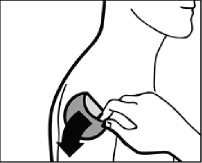
For patients starting treatment for the first time and for patients restarting Voleze after treatment interruption, please begin with the seconc picture.
each patch is sealed in its own protective sachet. You should only open the sachet when you are ready to apply the patch. Cut the sachet along the dotted line with scissors one remove the patch from the sachet.
n
o
CL
n>
QJ
“I
n>
QJ
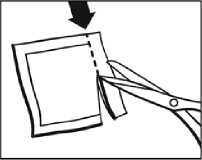
a protective liner covers the sticky side of the patch. Peel off one side of the protective liner and do not touch the sticky part of the patch with the fingers.
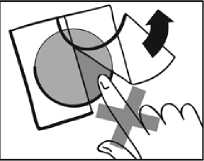
put the sticky side of the patch on the upper or lower back, upper arm or chest and then peel off the second side of the protective liner.
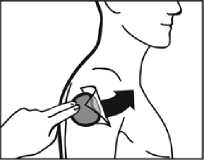
then press the patch firmly in place for at least 3C seconds using the palm of the hand to make sure thal the edges stick well.
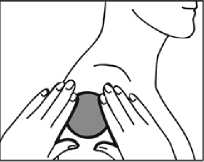
3. How to use Voleze
Always use this medicine exactly as described in this leaflet and as your doctor has told you. Check with your doctor, pharmacist or nurse if you are not sure.
If it helps you, you may write, for example, the day ol the week, on the patch with a thin ball point pen.
The patch should be worn continuously until it is time to replace it with a new one. You may wish to experiment with different locations when applying a new patch, to find ones that are most comfortable for you and where
clothing will not rub on the patch. , . „
® (continued overleaf)
n
o
CL
n>
0)
-i
n>
Q)

FOCUS

|
Version No.: |
103486/LF/314/02 |
|
Product Name: |
Rivastigmine transdermal 13.3mg/24h |
|
Pack Size: |
30 transdermal patches |
|
Component: |
Leaflet |
|
SKU: |
103486 |
|
Market: |
UK |
|
Production Site: |
Klocke Verpackungs -Service GmbH (PHAST) |
|
Revision No.: |
2 |
|
Revision Date: |
09/12/2015 |
|
Revised by: |
ADD |
|
CRF: |
AMCo.CRF.377.2015 |
|
Dimension: |
540 x 170 mm |
|
Commodity No.: |
N/A |
|
Pharma Code: |
N/A |
|
Core Spec Ref: |
N/A |
|
DCMF: |
N/A |
|
Print Colours: |
Black |
|
Non-Print Colours: |
Cutter |
|
Tech App. Date: |
07/12/2015 |
|
Min. Font Size: |
8.5 pt |
REGULATORY AUTHORITY APPROVAL CONFIRMATION
Confirmation that this artwork has been approved by the appropriate market authority (if applicable, e.g. MHRA, HPRA, etc.) and that Amdipharm have license approval to distribute this component for sale in the relevant market.
Accept Artwork / Reject Artwork
(Please strike off whichever NOT applicable)
Signature
Name .........................................................................
Date
PAGE 1 OF 1


4^
U)
How to remove your Voleze transdermal patch
Gently pull at one edge of the patch to remove it slowly from the skin. In case the adhesive residue is left over on your skin, gently soak the area with warm water and mild soap or use baby oil to remove it. Alcohol or other dissolving liquids (nail polish remover or other solvents) should not be used.
You should wash your hands with soap and water after removing the patch. In case of contact with eyes or if the eyes become red after handling the patch, rinse immediately with plenty of water and seek medical advice if symptoms do not resolve.
Can you wear your Voleze transdermal patch when you are bathing, swimming, or in the sun?
• bathing, swimming or showering should not affect the patch. Make sure the patch does not loosen during these activities
• do not expose the patch to any external heat sources (e.g. excessive sunlight, saunas, solarium) for long periods of time.
What to do if a patch falls off
f a patch falls off, apply a new one for the rest of the day, then replace it at the same time as usual the next day.
When and for how long to apply your Voleze Iransdermal patch
• to benefit from treatment, you must apply a new patch every day, preferably at the same time of day
• only wear one Voleze patch at a time and replace the patch with a new one after 24 hours.
If you use more Voleze than you should
f you accidentally apply more than one patch,
-remove all the patches from your skin, then inform
your doctor that you have accidentally applied more than one patch. You may require medical attention. Some people who have accidentally taken too much rivastigmine have experienced feeling sick (nausea), being sick (vomiting), diarrhoea, high blood pressure and hallucinations. Slow heart beat and fainting may also occur.
If you forget to use Voleze
If you find you have forgotten to apply a patch, apply one immediately. You may apply the next patch at the usual time the next day. Do not apply two patches to make up for the one that you missed.
If you stop using Voleze
Tell your doctor or pharmacist if you stop using the patch.
If you have any further questions on the use of this medicine, ask your doctor or pharmacist.
-
4. Possible side effects
Like all medicines, this medicine can cause side effects, although not everybody gets them.
You may have side effects more often when you start your medicine or when your dose is ncreased. Usually, the side effects will slowly go away as your body gets used to the medicine. Take off your patch and tell your doctor straight away, if you notice any of the following side effects which could become serious:
Common (may affect up to 1 in 10 people)
• loss of appetite
• feeling dizzy
• feeling agitated or sleepy
• urinary incontinence (inability to retain adequate urine)
• feeling or being sick, loose motions, iiTdlgesTiciToT abdeminor path
• headache or fainting
• feeling anxious or sad
• redness, itching, swelling, irritation at the site of application of patch
• general weakness, feeling tired, loss of weight or fever.
Uncommon (may affect up to 1 in 100 people)
• problems with your heartbeat such as slow heartbeat
• seeing things that are not really there (hallucinations)
• stomach ulcer
• dehydration (losing too much fluid)
• hyperactivity (high level of activity, restlessness)
• aggression.
Rare (may affect up to 1 in 1,000 people)
• falling.
Very rare (may affect up to I in 10,000 people)
• high blood pressure
• inflammation of the pancreas - the signs include serious upper stomach pain, often with feeling sick (nausea) or being sick (vomiting)
• bleeding in the gut - shows as blood in stools or when being sick
• seeing things that are not there (hallucinations)
• some people who have been violently sick have had tearing of the tube that connects your mouth with your stomach (oesophagus).
Reporting of side effects
If you get any side effects, talk to your doctor, pharmacist or nurse. This includes any possible side effects not listed in this leaflet.
You can also report side effects directly via the Yellow Card Scheme at: www.mhra.gov.uk/yellowcard.
By reporting side effects you can help provide more information on the safety of this medicine.
<J>
5. How to store Voleze
Keep this medicine out of the sight and reach of children.
Do not use this medicine after the expiry date which is stated on the carton and sachet after 'EXP'. The expiry date refers to the last day of that month.
Store in the original package in order to protect from light.
Keep the transdermal patch in the sachet until use.
This medicinal product does not require any special temperature storage conditions.
Do not use any patch that is damaged or shows signs of tampering.
After removing a patch, fold it in half with the sticky sides on the inside and press them together. Return the used patch to its sachet and dispose ol it in such a way that children cannot handle it. Do not touch your eyes with your fingers and wash your hands with soap and water after removing the patch. If your community burns domestic rubbish, you can dispose of the patch with your domestic rubbish. Otherwise, return used patches to a pharmacy, preferably in the original packaging.
Do not throw away any medicines via wastewater or household waste. Ask your pharmacist how to throw away medicines you no longer use. These measures will help protect the environment.
©-
6. Contents of the pack and other information What Voleze contains
The active substance is rivastigmine.
Each patch releasing 13.3 mg rivastigmine per 2A hours is 15 cm2 and contains 27 mg Rivastigmine.
The other ingredients are:
Film: Polyester film
Fluoro-coated polyester film Drug matrix: Acrylic adhesive. Acrylates
copolymer polyfbutyl methacrylat-co-methyl methacrylat) (80:20) Adhesive matrix: Silicone adhesive
Printing ink: Black printing ink
-What-Veleze-leoks-like-and-centents-ofthe-psGk-----
Each transdermal patch is a thin patch consisting of three layers. The outer layer is translucent, white and imprinted with black-printed as follows: “Rivastigmine" "13.3 mg/24 h"
One transdermal patch is packed in one child-resistant and heat-sealed sachet. The patches are available in packs containing 7, 10, 30, 60 and 90 sachets and in multipacks containing 60 (2 x 30) and 90 (3 x 30) sachets.
Not all pack sizes may be marketed in your country.
Marketing Authorisation Holder
Focus Pharmaceuticals Limited, Capital House,
1st Floor, 85 King William Street, London EC4N 7BL, UK. Tel: 00 44(0)1283 495 280
Fax: 00 44(0)1283 495 290
Email: medinfo@focuspharma.co.uk
Manufacturer
PHAST Gesellschaft fur Pharmazeutische Qualitatsstandards mbH, Kardinal-Wendel-Strasse 16, 66424 Homburg, Germany

Very rare (may affect up to 1 in 10,000 people)
• stiff arms or legs
• trembling hands.
Not known (frequency cannot be estimated from the available data)
• allergic reaction where the patch was used, such as blisters or inflamed skin
• the signs of Parkinson's disease get worse -such as tremor, stiffness and shuffling
• inflammation of the pancreas - signs include serious upper stomach pain, often with feeling sick (nausea) or being sick (vomiting)
• fast or uneven heartbeat
• high blood pressure
• fits (seizures)
-liver disorders (yellow skin, yellowing of the
whites of eyes, abnormal darkening of the urine or unexplained nausea, vomiting, tiredness and loss of appetite)
• changes in tests which show how well the liver is working
• feeling restless
• nightmares
• seeing things that are not actually there (hallucinations).
Take off your patch and tell your doctor straight away, if you notice any of the side effects above.
Other side effects seen with rivastigmine capsules or oral solutions and which may occur with the patch:
Common (may affect up to 1 in 10 people)
• too much saliva
• loss of appetite
• feeling restless
• generally feeling unwell
• trembling or feeling confused
• increased sweating.
Uncommon (may affect up to 1 in 100 people)
• uneven heart rate (e.g. fast heart rate)
• difficulty sleeping
• accidental falls.
Rare (may affect up to 1 in 1,000 people)
• fits (seizures)
• ulcer in the intestine
• chest pain - this may be caused by heart spasm
This medicinal product is authorised in the Member States of the EEA under the following names:
3411
Germany: Voleze 13,3mg/24h Studen transdermales Pflaster
United Kingdom: Voleze 13.3mg/24h Transderma Patch
For information in large print, audio CD or Braille please telephone 00 44 (0)1283 495 280 or email medinfo@focuspharma.co.uk.
This leaflet was last revised in November 2015.
103486/LF/314/02